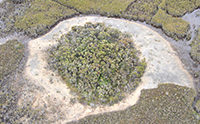The geology of south-west Western Australia interpreted from a biblical perspective. …read more Source: creation.com
By Dr. Gordon Wilson As is the case with many groups of living creatures, the frogs and toads (order Anura) are packed full of surprises waiting to be discovered and unveiled. …read more Source: AIG Daily
By Creation Moments There is a time and a place to defend your faith. Scripture tells us that we are always to be ready to give that defense to someone who asks us the reason for the hope that is in us (1 Peter 3:15). But what if the questioner is not interested in asking about the hope? read more …read more Source: Creation Moments
This article takes a look at Proverbs 8 and what it tells us about the role Wisdom played in God’s creation. …read more Source: creation.com
Answering a feedback about how to interpret neuroscience experiments. …read more Source: creation.com
Darwin proposed that evolution happens externally, that the environment shapes organisms. But a growing amount of evidence suggests the opposite: Most changes happen because the organisms themselves sense, and react to, the environment. A new report on gene regulation in mice intestines adds to the evidence of internal adaptation and design. More… …read more Source: icr.org
By Creation Moments Not every animal appears to be of equal value to God. Some of them, in Genesis 1, were blessed. Then there is the way that God described some of these creatures. read more …read more Source: Creation Moments
By Ken Ham Do you have a young person who is curious about God’s creation? Looking for a way to give the kids a fun experience and challenge them over the summer holidays? Want them to study science through the lens of Scripture? If so, you’ll want to check out Explore Science Camp, a five-day camp for fourth grade through high school, taking place here at the Creation Museum near Cincinnati this summer. These five days will be packed full of hands-on activities and fun science teaching through the lens of a biblical worldview This summer will feature our inaugural [More]
By Bodie Hodge Sadly, many people are more than willing to try to reinterpret Christ’s plain meaning in Mark 10 because of their absolute adherence to millions and billions of years. But it undermines the authority of the Bible, and in many cases it directly undermines the gospel itself. …read more Source: AIG Daily
Scientists believed marine stromatolites were extinct—until they found them living in Shark Bay, Australia, in 1956. Living stromatolites keep popping up in more diverse environments. The latest research identified them even living on land. More… …read more Source: icr.org
By Creation Moments It must have been a very exciting meeting of the Geological Society of London in December 1912. Charles Dawson was presenting a paper concerning a skull that he said had been found at a gravel pit in Sussex, England. The skull appeared to be half human half ape. The prevailing opinion of the time, as it is today, was that apes and humans had a common ancestor from which they had all evolved. read more …read more Source: Creation Moments
By Ken Ham Yesterday was National Sanctity of Human Life Day here in the United States. This day marks the bloodstained anniversary of Roe v. Wade, the US Supreme Court decision to legalize abortion (really the legalization of child murder)—since that day in 1973, an estimated 60 million children have been murdered in their mothers’ wombs in the Unites States. National Sanctity of Human Life Day seeks to give a voice to all those who have no voice and to advocate for life, not death. Well, I recently saw an article that just made me feel sick. Apparently, there is [More]
By Ken Ham If you’re Canadian and pro-life, well, you’re “not in line” with the government or society, according to the Canadian prime minister, Justin Trudeau. In a recent speech during his town hall tour across the country, Trudeau claimed that pro-life groups that aim to end abortion are “not in line with where we are as a government and, quite frankly, where we are at as a society.” His statement was met with enthusiastic applause. Trudeau’s comments come in the wake of a decision by the federal government to require any business or group that wants to apply for [More]
By Ken Ham We are deeply grateful for the hundreds of thousands of donors and supporters around the world who have prayerfully and financially supported AiG, to allow this ministry to reach millions each year with the message of biblical authority and the gospel. We honestly couldn’t do what we do without you—and that makes you a vital part of our ministry. We recently heard from a supporter who came to Northern Kentucky to see the Ark Encounter and Creation Museum. She raved about both attractions as most people who visit do. Here’s what she wrote: I had the pleasure [More]
Theistic evolutionists at BioLogos make a vain attempt to sidestep Jesus’ teaching on the age of the earth. …read more Source: creation.com
By Creation Moments When you come up against a Christian who believes in evolution, your conversations with him will be qualitatively different from the conversations that you might have with an unbeliever. It can be very frustrating and even depressing to encounter a Christian who says that he believes the Bible but does not believe the literal truth of what the Bible teaches in Genesis 1. read more …read more Source: Creation Moments
By Ken Ham Do you have a high school student in your life? There is tremendous pressure on teens—especially if they attend a government school—to accept the secular teaching about origins, morality, sexuality, and so much more. They need to be equipped to stand strong, to trust God’s Word from the very beginning, and to think biblically. What are you doing to equip them? We recently heard from a young environmental engineer who told us that she found our resources invaluable for helping her stand strong in her faith during her teen years. And she’s using these resources today to [More]
By Ken Ham Season two of Bill Nye “the Science Guy’s” Netflix show, Bill Nye Saves the World, was recently released. Two staff members viewed the episodes that were pertinent to origins and historical science, and they wrote a short review you can read below. But, as a quick summary, and as we’ve said before, Bill Nye is not kid friendly at all (this new show is geared toward millennials), and both seasons of this show’s content (which pushes a secular view of origins and morality) are certainly not appropriate for children. He is definitely not Bill Nye the kid-friendly [More]
By Rand Hummel Who has the final say in your home? Who settles disputes? Who decides right and wrong in your family? …read more Source: AIG Daily
By Devon Spencer, DVM Does the difference in eye contact times between domesticated dogs, dingoes, and wolves prove an evolutionary progression from one to another? …read more Source: AIG Daily
By Creation Moments It is impossible for us, 6,000 years later, to get into the mind of the first man. For a start, he was created perfect, and we have no idea what it is like to be perfect or to have a perfect mind. Then again, given that he was perfect, we have difficulty in understanding why he would deliberately choose to disobey God and eat the fruit. read more …read more Source: Creation Moments
Many claim that science proves the Earth is billions of years old. But Genesis chapter one teaches that God created the universe and everything in it in only six days. How long ago did God create the universe and how long did He take to do it? Does this issue really matter? Listen: The Timescale of Creation | The Institute for Creation Research
By Mark Looy Martin Luther King Jr. Day acknowledges his efforts to end racial segregation and secure civil rights for Americans, African-Americans most of all. …read more Source: AIG Daily
While the entire story of evolution faces problems, perhaps its greatest hurdle is answering how life originated. Now a famous piece of research that appeared to shed some light on how life began has been falsified and retracted…and one of its authors was a Nobel Laureate. More… …read more Source: icr.org
By Sarah Chaffee On this episode of ID The Future, we begin a series on human origins with biologist Ann Gauger, CSC Director of Science Communications. Gauger centers her discussion around a big new anthology from Crossway Books that she contributed to and helped edit, Theistic Evolution: A Scientific, Philosophical, and Theological Critique. Among the tenets of theistic evolution is the idea that humans evolved from a large population of ape-like creatures. But is that idea scientifically plausible? Today’s episode delves into the fossil evidence. Listen in as Gauger describes not a mere gap in the fossil record but a [More]
By Ken Ham There’s been a lot of buzz about STEM in the last few years. STEM stands for science, technology, engineering, and mathematics. STEM toys and camps have become increasingly popular with young people, and many parents are looking for ways to encourage their children to explore STEM. But, sadly, it’s hard to find STEM resources that affirm the truth of God’s Word and point kids toward the Creator. That’s why we’re thrilled about a unique creation apologetics STEM camp, Camp Infinity, held here in Northern Kentucky. Camp Infinity (Ci) was started by an AiG board member, Dan Wooster, [More]
Does astronomy disprove the Bible like many scoffers claim? Actually, history confirms that the Bible is always right when it touches on any subject—including astronomy. Learn how the Bible got astronomy right when it addresses the roundness of Earth, its suspension in space, the expansion of the heavens, and more! Listen: Astronomy: The Bible Got It Right! | The Institute for Creation Research










































